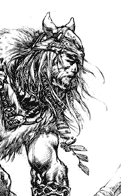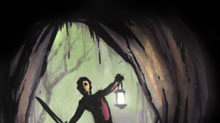Rune RPG Opposing Viewpoint
by Mike Sugarbaker
In our Rune playtest, I created a stereotypical dumb brute named
Wulfgaar the Stupid. Colin played a well-rounded, intelligent Viking
named Sigbjorn - the defacto leader of the party. Nathan played
Vorash, who took the subtle approach, taking skills in archery,
healing, that sort of thing. Now, I'm not a frequent role-player,
myself, mostly because I seem always to end up with the kind of
character Nathan had. The kind that hangs out in the back of a combat,
and when the GM asks me what I'm doing this round, all I can really
do is mutter "Magic Missile" again, and then go back to
my magazine.
 In
a combat-driven game, characters like that are going to greatly
reduce the fun for the person playing them; I'm embarrassed at how
long it took me to figure this out. Rune is a combat-oriented game
to the max, and the fact that I was playing a big meathead war machine
helped me have more fun, but something still bothered me. It might
be a problem with RPGs in general.
In
a combat-driven game, characters like that are going to greatly
reduce the fun for the person playing them; I'm embarrassed at how
long it took me to figure this out. Rune is a combat-oriented game
to the max, and the fact that I was playing a big meathead war machine
helped me have more fun, but something still bothered me. It might
be a problem with RPGs in general.
I didn't feel like I had any meaningful choices in this game. I
had a big troll to fight, after Sigbjorn ran up to the other one,
and I was perfectly free to choose... um... which weapon I used
to whale on him mindlessly turn after turn. It all came down to
the dice. At least I felt engaged enough, thanks to my axe-wielding-terror
status, to care whether or not I got a good initiative roll.
But by and large, I felt like I was on rails.
Allan tells me that this problem is somewhat inherent to RPG combat;
there's one or two things your character is good at, and usually
one thing that your character's gonna be good at right now,
so in a given combat you make a choice and go with it unless something
weird happens. Your only other choice, in most RPG combats, is to do something
other than combat.
Rune doesn't give you that choice. Given that it's based on a linear,
combat-oriented computer game, Rune just comes out and tells you,
you're going to be fighting stuff, because that's the Viking way.
When a gremlin runs by in the second encounter of the sample scenario,
you don't get to choose to grab him or shoot him or communicate
with him. You get one roll to spot him, and one roll to trip him,
because that's what's in the encounter. Rune is linear.
I talked it over with Aaron out at EndGame,
and his viewpoint gelled my own. "Rune is not an RPG,"
he told me. "It's a board game." This reminded me of what
Allan told me about D&D3 when he was first reading it: if you
can't play a combat without miniatures, then it's actually a miniatures
game. Of course, D&D is a lot more flexible and powerful than
that; it has whole worlds of roleplaying that are possible outside
of combat. Rune doesn't, unless those opportunities are built into the Encounter.
The difference in Rune, and what I think might be its saving grace,
is the Encounter design system. My turn hasn't yet come around to
get cozy with Rune's Encounter creation system, but it seems to
me that the real game lies there. When Allan introduced us to the
Encounter-design and competitive-running concepts we were going
to take on after running the sample scenario, he said, "we've
done the playtest, and now we have to do the design test."
Now, I would respond that the design is the play, and when you actually
portray your character and roll your dice through a Rune Encounter,
all you're doing is checking the results of the Encounter-design
game.
If that's a little too deep for you, try this: Your goal, in a
Rune session, is to earn Victory points. It is not, strictly speaking,
to complete the scenario (although the point system certainly rewards
this) or to experience a new world. It certainly isn't to have the
kind of awesome "oh-shit" experiences Allan is fond of
creating as a GM - it's hard to be overawed by your foes when they
were mathematically generated to suit the second-lowest stats in
your party. Cooperation between allies, a given in most RPG situations,
is only a shell over your real game in Rune. You are an extra step
removed from the game's reality while you play.
Rune is not a role-playing game. It may be an excellent game; not
having attempted to play it yet as anything other than a role-playing
game, I can't say. The encounter-design rules are fascinating as
rules - I have yet to see if they're fully successful at producing enjoyable, balanced Encounters to play in a competitive
situation. Rune might be a board game, or a miniatures game, or
simply a wedge with which to push RPGs into new directions that
solve old problems. But it's not an RPG, and if you go into it expecting
one, you'll be disappointed. Unless you're perfectly happy to roll
dice and beat on things all day, in which case you're not reading
this - but at OgreCave, we think the unexamined game is not worth
playing. At least, not for longer than a few hours.
Rune warrants a few more hours.




